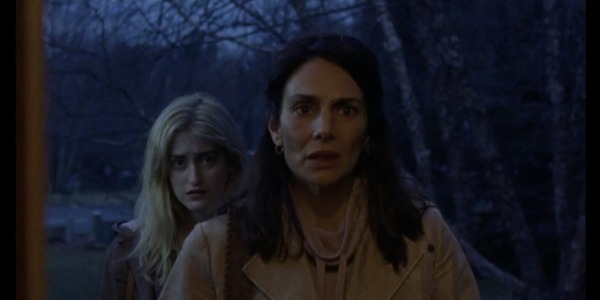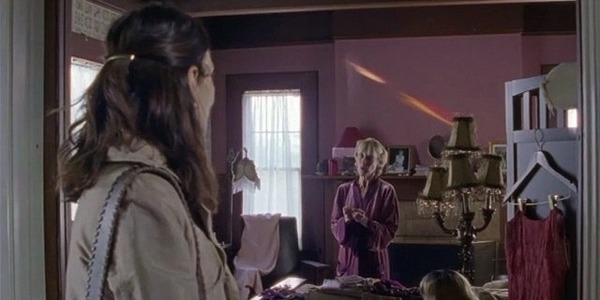GIVING BIRTH TO A BUTTERFLY: Mothers, Sons And Identity Theft

Payton McCarty-Simas is a freelance writer and artist based in…
No one is who they say that are in Giving Birth to a Butterfly, especially not the women. Beautifully shot on 16mm, Theodore Schaefer‘s directorial debut (available to stream today) follows Diana (Annie Parisse), a frustrated wife and mother, who finds her identity has been stolen by internet fraudsters unknown, in the midst of a crisis of confidence for her entire family. Her husband, Daryl (Paul Sparks) wants to be a chef but finds himself stuck in a dead-end job at a burger place, wearing someone else’s apron as he makes a change.
His children call him chef as they pass take-out back and forth. Their son, Drew (Owen Campbell), is really named Andrew, but Daryl insists the family only use names that start with D. Drew has agreed to be the father to his pregnant girlfriend’s child by someone else, taking on the role eagerly, lacking an identity of his own. His girlfriend, Marlene (Gus Birney), lives in her delusional mother’s shadow, her pregnancy unacknowledged, her presence largely ignored. In the face of Diana’s sudden destitution, she and Marlene embark on a secret road trip to track down the thieves and get Diana’s money back, to strange and unexpected results. Each individual character is well drawn, and the film’s first act in particular presents an intriguing set up for a mystery of both cosmic and quotidian proportions. Yet, while there is potential for poignancy in this (overtly) Homeric and surreal journey for self-acceptance, as it progresses, like its titular butterflies, the film ultimately gets lost in the breeze.
Ghosts
Giving Birth to a Butterfly is a story about the ties that bind us, to each other as well as to reality itself. The responsibilities of children, family, and adulthood drag at these characters as they drift through life delivering poetic monologues back and forth, unheard and overlooked. Diana and Daryl (real-life spouses) seem to have nothing in common anymore, never communicating directly as they save up for Daryl’s restaurant and process their son’s unorthodox relationship. They communicate around each other through strained silences and the occasional insult. For Diana, their marriage has come to represent compromise in a life already full of them.

At work, a young boy asks her to sell him a single condom from a pack (“do they come in different sizes?” he asks hopefully. “Why don’t you start with these…” she replies, handing him a generic box). He doesn’t have the money, and she offers to cover them herself, in one of the seemingly endless concessions she’s made to men at this juncture of her life. When her credit card gets declined, we learn that her one attempt to do something that isn’t for Daryl has backfired and she’s lost their shared savings. Her reason: She wanted to make some money for her daughter, Danielle (Rachel Resheff), a phantom of a character who’s working as a technician at the community theater during a production fittingly called “Ghost,” shining a light on others and, like Diana, leaving little space for herself.

Even on stage, actors revoke their own identities (through stage names, through their roles, etc.) and lose their sense of self. Marlene’s mother (and Birney‘s real-life mother, Constance Shulman), channels Norma Desmond and Blanche DuBois as she stalks through her home in thrift gowns, giving “tell-all” interviews to invisible reporters: “It’s about time I tell my story!” She is never addressed by her first name, Monica, usually reduced to her more mundane role as Marlene’s mother even as she tries to adopt a stage name no one will ever hear for her nonexistent stage roles. Marlene suggests they name the baby after her at one point: “What about Monica? My mother’s not using it.” “Sometimes I think about getting a name change,” Diana grimly tells Marlene at one point on their trip. Motherhood, like marriage, isn’t easy.
Conclusion
Each performer gamely attempts to flesh out these spectral characters, but weighty dialogue bogs them down. Tragically, the intentionally on-the-nose dialogue of “Ghost,” the play Danielle is lighting, shares an uncomfortable similarity to the dialogue the leads deliver in reams. Cryptic, Lynchian monologues can be intriguing, but quickly lose their appeal when it becomes apparent that there is little else propelling the narrative. The mysteries at the film’s heart have more potential than payoff.
Nevertheless, the film is undeniably creative and dreamlike, with moments of winning, artful surrealism, largely created through the use of dissolves and striking imagery (aquariums are a constant presence, seeming to witness the film like a Greek chorus presided over by a tropical fish named Homer – though Drew insists it’s Homer for Simpson). The Alice in Wonderland air Schaefer aims to lend the material is engaging, coming through in flashes that could have been aided by a greater variety of scenarios and concepts. At one point, Monica tells Diana never to say, “good luck,” only “break a leg.” Here’s wishing Schaefer the same for his next film.
Giving Birth to a Butterfly is playing in select theaters and is available to stream as of May 16th.
Does content like this matter to you?
Become a Member and support film journalism. Unlock access to all of Film Inquiry`s great articles. Join a community of like-minded readers who are passionate about cinema - get access to our private members Network, give back to independent filmmakers, and more.
Payton McCarty-Simas is a freelance writer and artist based in New York City. They grew up in Massachusetts devouring Stephen King novels, Edgar Allan Poe stories, and Scooby Doo on VHS. Payton holds a masters degree in film and media studies from Columbia University and her work focuses on horror film, psychedelia, and the occult in particular. Their first book, One Step Short of Crazy: National Treasure and the Landscape of American Conspiracy Culture, is due for release in November.













